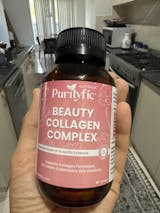
6 Types of Vitamins for 6-Month-Old Babies and Their Recommendations

In a study of the Pediatric Clinics of North America, it was stated that breast milk will not meet the need for the intake of all vitamins for babies who breastfeed exclusively, especially vitamin D.
Meanwhile, vitamin K should be given immediately at birth.
Other vitamin deficiencies are still scarce, especially if pregnant women get adequate nutrition.
Read: Don't Underestimate! The Impact of Vitamin A Deficiency on Babies
Although breast milk is an ideal food for newborns, it still does not meet the needs of two types of vitamins for a 6-month-old baby, namely vitamin D and minerals such as iron.
Other vitamins that may be needed by the Little One are vitamins A, B complex, and C for more optimal growth.
So, what are the types of vitamins for a 6-month-old baby that are needed? Check it out below!
Vitamins for 6 Months Baby
Launching the Indian Journal of Medical Research, it is said that the adequacy of vitamin D content in the body when pregnant is related to the large intake of minerals in the bones when Moms were children.
For this reason, vitamin D is a vitamin for a 6-month-old baby that essentially works to build strong bones in the future.
Doctors recommend that 6-month-old babies get 400 IU a day to meet the needs of the body through supplements.
The source of vitamin D that can be obtained from food is by eating fatty types of fish (for example salmon, tuna, and sardines) as well as eggs.
Some breakfast cereals also have additional vitamin D in them.
However, a natural source of vitamin D that is easy to get and free of charge is sunlight.
2. Iron
Iron is an essential nutrient needed by humans for blood cell health and brain development.
Read: Iron For Children: Benefits, Dosages and Side Effects
In infants, it is important to receive sufficient iron intake to prevent iron deficiency and anemia.
Babies are born with sufficient iron reserves until they are about 4-6 months old.
It is worth giving an additional iron supplement as much as 1 mg per kilogram of baby weight or consulting a pediatrician for more precisely.
Foods that contain iron include cereals, meat, and green vegetables.
However, the ideal content of iron needed by the body is as much as 11 mg every day.
So, the doctor may suggest that continue to give supplements until the Little One can really meet their iron needs through full solid food.
3. Vitamin A
Vitamin A plays an important role in the body, such as:
- Strengthens the child's immune system
- Assists vision in dim lighting
- Keeping skin healthy
- Prevents measles and diarrhea
- Prevents anemia
- Helps the physical growth of the child
One of the impacts of vitamin A deficiency is abnormalities in the eyes that generally occur in children aged 6 months- 4 years which are the main cause of blindness in developing countries.
Foods that can help meet vitamins for babies of 6 months with sufficient vitamin A, namely dairy products, carrots, sweet potatoes, mangoes, nuts, and green vegetables.
Vitamin A includes fat-soluble vitamins, so it can be stored by the liver for up to 6 months.
4. Vitamin B Complex
The Vitamin B complex is a combination of several B vitamin nutrients that work together to help the body process proteins, carbohydrates, and fats into energy.
This intake is also a vitamin for a 6-month-old baby which is no less important.
The Little One needs vitamin B complexes for the perfect metabolism of breast milk or formula milk.
Foods containing vitamins B complex, namely:
- Fruits such as watermelon and banana
- Leafy vegetables
- Dairy products
- Fish and seafood
- Egg
- Meat
- Cereal
- Nuts
- Potato
- Liver
5. Vitamin C
At the age of 0-6 months, babies need 40 mg of vitamin C.
This amount can be met by breast milk if moms daily take vitamin C at a dose of 120 mg every day.
As a vitamin for a 6-month-old baby, vitamin C acts as an antioxidant and supports the immune system and collagen production.
Vitamin C also helps the body absorb iron. Moms can meet their vitamin C needs by giving the Little One food rich in vitamin C and breast milk.
Sources of vitamin C from food are obtained from oranges, kiwi, strawberries, broccoli, and papaya.
6. Omega-3 Fatty Acids
Omega-3 is very important to give as a vitamin to babies at 6 months.
This fatty acid arena has a key role in the growth and development of the Little One.
Omega-3 is considered an essential fatty acid, since the body cannot produce it on its own and needs to get it from food.
The three main types contained in omega-3s are alpha-linolenic acid (ALA), eicosapentaenoic acid (EPA), and docosahexaenoic acid (DHA).
The daily dose for babies of 6 months, is 0.5 grams.
You can meet the vitamin intake for this 6-month-old baby by giving food, such as salmon, soy, walnuts, and sardines.
That's an explanation of vitamins for a 6-month-old baby. To be more confident and safe for the Little One, you can immediately consult a doctor.
Seeing the Little One grow up healthy and cheerful is the hope of every parent, right? May the Little One always be healthy!








